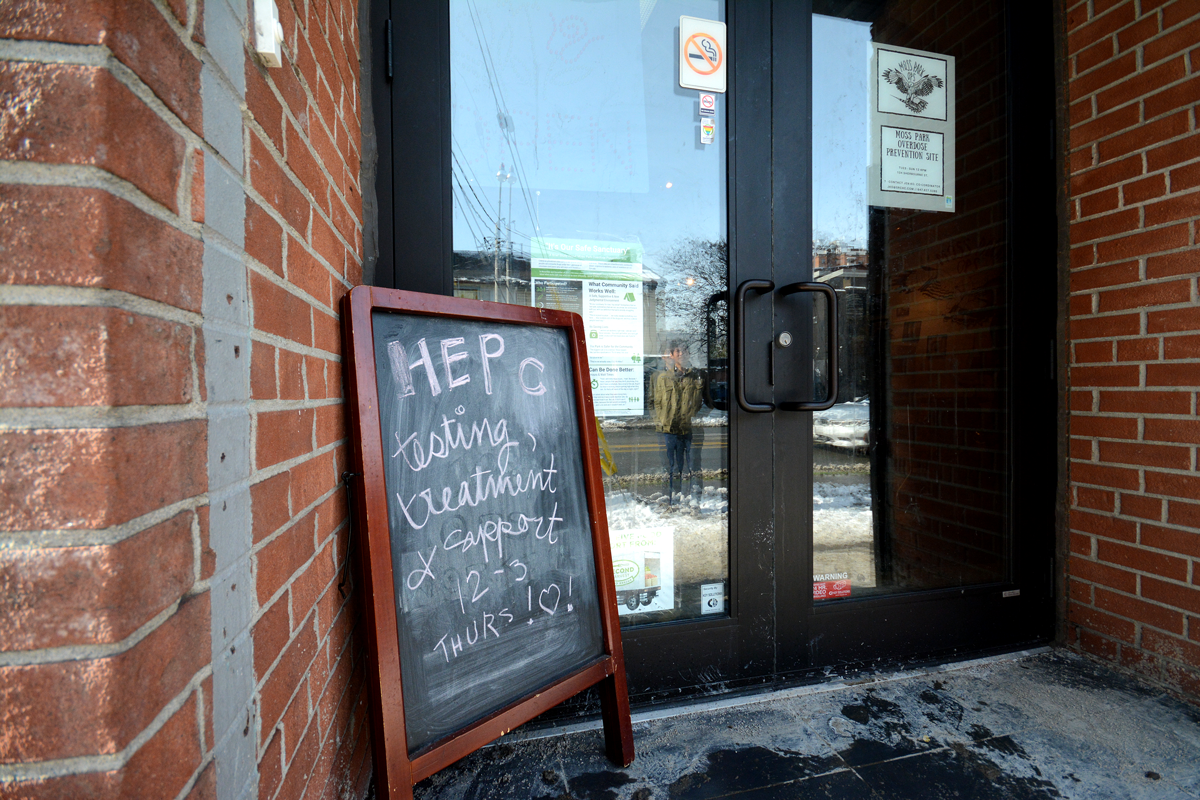Hepatitis C Treatment Program at Moss Park Consumption and Treatment Service
2019
Integrating hepatitis C care into an overdose prevention service
The Moss Park Consumption and Treatment Service (MPCTS) first opened in August 2017 in the east end of downtown Toronto. MPCTS provides supervised injection and consumption services, distributes harm reduction supplies and offers other drug-user health services. MPCTS currently serves over 100 people a day.
In 2019, MPCTS launched an integrated hepatitis C testing and treatment program. The hepatitis C program was implemented to reach people who use MPCTS services (referred to as members) and face barriers to accessing traditional healthcare. It aims to increase uptake of testing and treatment services in a low-threshold, safe environment and to decrease loss to follow-up by reaching members who regularly access services at MPCTS.

The front entrance of Moss Park CTS with a sign for the hepatitis C program.
Why integrate hepatitis C treatment into a supervised consumption service?
MPCTS developed the program in response to service users asking for more support for hepatitis C testing and treatment. Some had already been diagnosed with hepatitis C and had been referred to a nearby community program that provides hepatitis C treatment. However, a number felt uncomfortable accessing care at a health centre, some due to negative past experiences with care providers (e.g., stigma experienced in health care settings as a person who uses drugs). Past negative experiences with healthcare providers/systems are a major barrier to hepatitis C care. Members also gave feedback that the structure and scheduling of other hepatitis C programs was a barrier.
MPCTS developed the hepatitis C program with a low-barrier approach to meet the needs of people who use drugs. Before the program was implemented, individuals often had to attend several separate appointments at multiple agencies to receive medical assessments, obtain identification documents, apply for insurance coverage and then receive ongoing monitoring and support. The MPCTS hepatitis C program enables members to obtain all of these services in one place. The program was also developed to address the lack of community-level prescribers and the lack of programs who will work with people who use drugs in a stigma- and judgment-free environment.

The entrance and intake area at Moss Park CTS.
How does the program work?
A treatment nurse from the Toronto Community Hepatitis C Program, a community-based treatment program, comes to MPCTS each week for a three-hour clinic. During these visits, this nurse works alongside other nurses, overdose prevention workers and community health workers, many of whom have lived experience.
During clinic hours, the visiting hepatitis C nurse performs testing and checks in with existing patients on treatment within a converted clinical space at MPCTS. Hepatitis C testing is done using a standard antibody test for hepatitis C, followed by an RNA viral load test if the antibody test is positive. The nurse draws blood on-site at MPCTS for both of these tests; the blood is taken to a nearby health centre for processing and delivery to the testing laboratory. Other clinical services, including wound care, testing for sexually transmitted and blood-borne infections, and referrals are also available during clinic hours. Once hepatitis C test results are available, they are communicated to members at subsequent nurse visits. If this is the first time a member has tested positive for hepatitis C, arrangements are made for a re-test 6 months after the initial blood draw. This re-test is a requirement for publicly covered treatment in Ontario.
Members who are ready to engage in hepatitis C treatment are offered two options: they can be referred to the Toronto Community Hepatitis C Program group program at a nearby community health centre, or they can receive treatment on-site at MPCTS. Baseline blood work is done and blood marker indicators of liver fibrosis are tested before treatment.
For on-site hepatitis C treatment, members receive a medical assessment and prescriptions during an on-site appointment with a prescriber. Members choose the method of medication dispensing that works best for them (daily or weekly dispensing at a pharmacy, or daily or weekly dispensing at MPCTS). MPCTS staff and the treatment nurse check in with people on treatment at least once a week, primarily in-person when members access the site. Any monitoring or follow-up blood tests, including for liver fibrosis, are performed on-site.
MPCTS implemented the program without any additional funding and so relied heavily on existing resources. For members who receive their medications at MPCTS, community pharmacies dispense the medications to MPCTS nurses who oversee daily or weekly distribution of hepatitis C treatment to members. The MPCTS staff also provide counselling and peer support for members before and during treatment. Because many members are regular visitors to MPCTS, staff have developed supportive relationships with them. They are able to easily follow up and identify any needs or barriers during testing or treatment, actively engage in case management and get advice from the hepatitis C nurse on how to manage issues.
A significant piece of work was setting up computers to enable workers to access medical records, order and print laboratory tests and write prescriptions on-site. The computer software and network linkages were important in supporting comprehensive clinical services on-site.

The consumption room at Moss Park CTS.
What are the accomplishments and future directions?
In the first six months, 32 people engaged in testing through the MPCTS hepatitis C program. By using MPCTS as a meeting place, all but one of the 32 people tested received their test results. Toronto Community Hepatitis C Program staff were initially concerned it would be difficult to follow up with MPCTS members, many of whom do not have fixed addresses or phone numbers. However, the membership of MPCTS is relatively constant, and follow-up has been effective because members tend to visit the site regularly and staff work to maintain supportive relationships.
Of those members who completed blood tests, 13 tested positive for hepatitis C. Since June 2019, a prescriber has been on-site and able to initiate treatment for five people, with two others waiting for follow-up testing to confirm that they have a chronic infection. A number of other members have expressed interest in beginning treatment and are in various stages of treatment work-up.
In the future, the program is looking to expand the peer mentorship and health navigation aspect of the program. This may include an element where MPCTS members who have completed treatment can engage and support other members who are receiving hepatitis C care and assist them in seeking any health services they may need that are not related to their hepatitis C care.
MPCTS is also looking to expand testing services on-site, including implementing RNA point-of-care testing in a research capacity. This would enable the program to offer members more rapid diagnosis of hepatitis C and initiation of treatment. Additional testing, such as HIV point-of-care testing, will also be performed on-site.
Given the tight network of frequent service users at supervised consumption services, a community-based model of care in this setting has been effective. According to the hepatitis C treatment nurse, “the keys to success have been leveraging the existing strength of community connections and resources, and following the feedback from members to develop and roll out this service.”
Contact Information
Bernadette Lettner
Hepatitis C Treatment Nurse, Toronto Community Hepatitis C Program
blettner@srchc.com
416-302-5675
